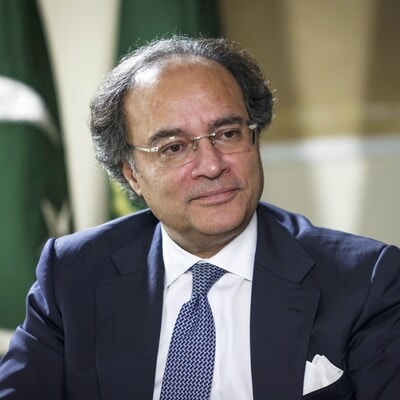)
Muhammad Aurangzeb, Pakistan’s finance minister, during an interview in Islamabad, Pakistan, on Friday, March 22, 2024. File image
Pakistan is seeking the re-profiling of over $27 billion in debt and liabilities owed to China, Saudi Arabia and the United Arab Emirates (UAE) to secure an International Monetary Fund (IMF) bailout package and ease consumer tariffs and energy sector foreign exchange outflows, reported Pakistani publication Dawn on Monday.
Pakistani Finance Minister (FM) Muhammad Aurangzeb on Sunday said that Islamabad had already requested the three lenders to roll over their more than $12 billion annual debt portfolio by three to five years so that Pakistan can secure the IMF board’s approval for a $7-billion economic bailout by next month.
While acknowledging the difficulties faced by all segments of Pakistani society because of economic challenges, high interest rates, energy prices, currency devaluation, and increased tax burdens, the Pakistani FM emphasised the necessity of tough measures due to the loss of fiscal space.
Having stressed the importance of long-term structural solutions, Aurangzeb said that Pakistan no longer had the option of doing what it has been in the past for short-term relief and objectives.
How is Pakistan dependent on China, Saudi and UAE?
Describing Pakistan’s financial arrangement with these three countries as “peculiar”, the report explains that they help Islamabad by way of commercial loans and SAFE deposits, which are rolled over every year and make up a major chunk of the IMF programme in terms of external financing needs.
According to the report, Pakistan has requested that the maturity period of these loans — $5 billion from China, $4 billion from Saudi Arabia, and $3 billion from the UAE — be extended to at least three years. This will reportedly lead to greater predictability under the IMF programme.
How has China responded to Pakistan’s request?
Aurangzeb added that the process of debt and equity rescheduling had started and would now go to relevant financial institutions and sponsors of Chinese projects, for which Pakistan was hiring Chinese consultants.
According to the report, Aurangzeb was in contact with the finance ministers of China, Saudi Arabia and the UAE for the extension in debt rollover for three years and that they had assured their support, which would place Pakistan in a very comfortable position in terms of external financing gap.
“Between now and the IMF board meeting (on the bailout package), we have to ensure confirmation of external financing” from friendly bilateral partners, Aurangzeb said, adding that the Chinese energy sector debt re-profiling was not related to the IMF programme.
What’s next for Pakistan?
Dawn quoted Aurangzeb as saying that the IMF had worked out a financing needs assessment for Pakistan for three years that also included its own $7-billion Extended Fund Facility. He added that after the rollovers from the three countries, Pakistan’s remaining external financing gap would become very manageable.
Stating that Pakistan was not seeking any incremental financing from the three countries, Aurangzeb added that the only incremental measure requested was an extension in the maturity period for three years instead of yearly rollovers.
The Pakistani FM also explained that financial re-profiling of energy sector payments to China would have to be discussed with project sponsors and banks one by one. He added that the process would now move forward on that basis.
Aurangzeb also said that the reprofiling of the China–Pakistan Economic Corridor (CPEC) debt was discussed with the governor of the Chinese central bank, adding that this would require a project-by-project process.
First Published: Jul 29 2024 | 5:23 PM IST
